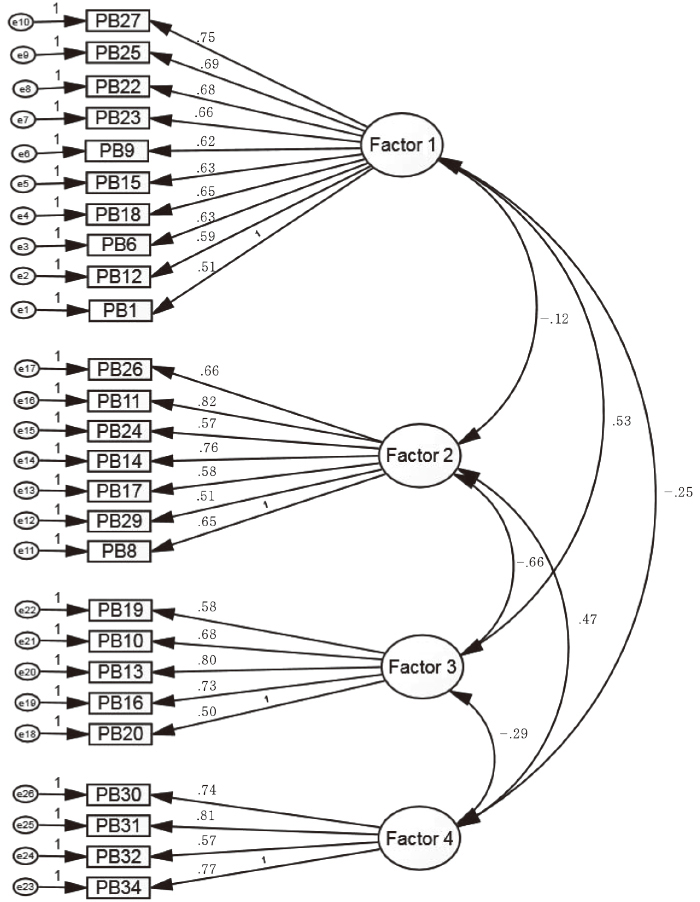J Korean Acad Nurs.
2015 Oct;45(5):650-660. 10.4040/jkan.2015.45.5.650.
Development of a Measurement Instrument for Parenting Behavior of Primary Caregivers in Early Childhood
- Affiliations
-
- 1Department of Nursing, Yeoju Institute of Technology, Yeoju, Korea.
- 2Department of Nursing, Sahmyook University, Seoul, Korea. kangka@syu.ac.kr
- KMID: 2363090
- DOI: http://doi.org/10.4040/jkan.2015.45.5.650
Abstract
- PURPOSE
The purpose of this study was to develop an instrument to measure the parenting behavior of primary caregivers of children in early childhood.
METHODS
An instrument was developed according to Devellis's instrument development process. The participants in this study who completed the main survey were 370 mothers and grandmothers. The survey was conducted from June 1 to July 30, 2014, and collected data were analyzed using item analysis, half-split reliability and Cronbach's alpha coefficient, exploratory and confirmatory factor analysis, convergent validity.
RESULTS
The factor structure of the instrument showed the cumulative variance as 55.7% in the factor analysis. As a result of a confirmatory factor analysis, a four-factor structure was found to be appropriate, and the construct validity and convergent validity of the instrument were thereby confirmed. The finalized parenting behavior instrument consisted of 26 items and four independent factors: affectionate, laissez-faire, educational and impulsive. A five-point Likert scale was employed, and a higher score in a particular factor showed that most of the behaviors belonged to the factor.
CONCLUSION
The instrument developed in this study was found to be reliable and valid, and can be used to develop parent-child relationship building.
Keyword
MeSH Terms
Figure
Cited by 1 articles
-
Motherhood Ideology and Parenting Stress according to Parenting Behavior Patterns of Married Immigrant Women with Young Children
So-Hyun Moon, Miok Kim, Hyeun Na
J Korean Acad Nurs. 2019;49(4):449-460. doi: 10.4040/jkan.2019.49.4.449.
Reference
-
1. Park SS, Park YH. The relationship among rearing environment attachment and self-identity. J Human Stud. 2005; 19:41–62.2. Kang JH, Oh KJ. Gender differences in the effects of preschoolers' age, temperament and parenting for internalizing and externalizing problems. Korean J Woman Psychol. 2011; 16(1):1–21.3. Kim HK, Yoo MS. The effects of parenting behaviors and children's playfulness on emotional intelligence. Korean J Child Stud. 2010; 31(5):115–130.4. Lim ST, Khu SS. Comparing the effects of family structural and parenting environments on children's maladjusted emotional behaviors. J Child Educ. 2006; 15(3):115–131.5. Park SJ. Content analysis of child rearings of mothers in infant and child preschool. Child Health Nurs Res. 2014; 20(1):39–48. DOI: 10.4094/chnr.2014.20.1.39.6. Rhee S. The study for the development and validation of parenting behavior scale' parents with school-age children [dissertation]. Seoul: Ewha Womans University;2012.7. Kim HS, Kang KA, Kim SJ, Kim HO, Moon SY, Park SN, et al. Child · adolescence health nursing. Seoul: Koonja;2013.8. Choi MK. The relationship between mothers' parenting, children's self-esteem, and stress. Korean J Child Stud. 2011; 32(2):105–121.9. Kim KS, Song YA. Human growth · development & health across the life span. Seoul: Shinkwang;2013.10. Fuligni AJ. The academic achievement of adolescents from immigrant families: The roles of family background, attitudes, and behavior. Child Dev. 1997; 68(2):351–363.11. Kim MS, Moon HJ. Relationship between parenting stress and parenting efficacy on parenting behaviors in mother with young children. J Korean Home Econ Assoc. 2005; 43(8):25–35.12. Darling N, Steinberg L. Parenting style as context: An integrative model. Psychol Bull. 1993; 113(3):487–496. DOI: 10.1037/0033-2909.113.3.487.13. Kim S, Kim A. Development and validation of the perceived mother's parenting behavior scale: An application of the self-determination theory. Korean J Educ Psychol. 2012; 26(3):717–738.14. Park SY, Lee S. A preliminary study for the standardization of the ⌜Korean maternal behavior inventory⌟. Fam Environ Res. 1990; 28(1):141–156.15. Oh SS, Lee JS. Way of parenting and the child's perception of the relationship between characteristics and definitions. Korea Inst Behav Sci Stud Notes. 1982; 11(1):1–15.16. Lim JH, Chung OB. Development and initial validation of the Korean parenting inventory. Korean J Hum Dev. 2004; 11(4):55–73.17. Jeong GY, Shin HC. Validation of the Korean version of parents as social context questionnaire (PSCQ). Korean J Couns. 2011; 12(4):1287–1305.18. Huh MY. A study for the development and validation of an inventory for parenting behavior perceived by adolescents. Korean J Youth Couns. 2004; 12(2):170–189.19. Perris C, Jacobsson L, Lindström H, von Knorring L, Perris H. Development of a new inventory assessing memories of parental rearing behaviour. Acta Psychiatr Scand. 1980; 61(4):265–274.20. DeVellis RF. Scale development: Theory and applications. 3rd ed. Thousand Oaks, CA: Sage Publications, Inc.;2012.21. Park SJ, Kang KA, Kim SJ. Types of child rearing behavior of parents during early childhood: Q-methodological approach. J Korean Acad Nurs. 2013; 43(4):486–496. DOI: 10.4040/jkan.2013.43.4.486.22. Park SJ, Kim SJ, Kang KA. Integrative review of nursing intervention studies on mother-infant interactions. Child Health Nurs Res. 2014; 20(2):75–86. DOI: 10.4094/chnr.2014.20.2.75.23. Nunnally JC, Bernstein IH. Psychometric theory. 3rd ed. New York, NY: McGraw Hill;1994.24. Han SS, Lee SC. SPSS nursing and health statistical analaysis. Seoul: Hyunmoon;2006.25. Cho SB. LISREL structural equation model. Seoul: Youngji Publishers;2000.26. Minjung Publishing Co.Minjung's essence Korean-English dictionary. Paju: Author;2013.27. Kim GS. New AMOS 16.0 analysis structural equation modeling. Seoul: Hannarae Publishing Co.;2007.28. Kaplan RM, Saccuzzo DP. Psychological testing: Principles, applications, and issues. 5th ed. Belmont, CA: Wadsworth/Thomson Learning;2009.29. Park HJ. Development and validation of dysfunctional parenting scale [dissertation]. Seoul: Korea University;2010.
- Full Text Links
- Actions
-
Cited
- CITED
-
- Close
- Share
- Similar articles
-
- Influence of Parents' Parenting Efficacy on Health Promotion Behavior in Early Childhood
- Degree of Parenting Stress and Fatigue Perceived by Primary Caregivers of Young Children
- Impact of attachment, temperament and parenting on human development
- Childhood Obesity among Socioeconomically Vulnerable Families: A Path Model Using Parenting Behavior and Its Associates
- Gender-specific Problem Behaviors of School-aged Children according to Parenting Characteristics in Poverty


